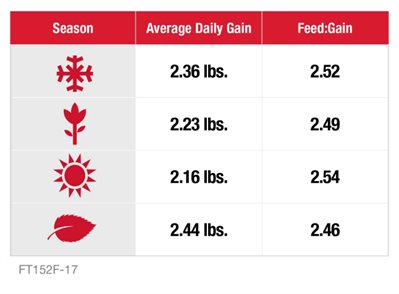
Tackle Heat Stress in Growing Pigs and Finishing Pigs
Grow/Finish : Grow Finish Production

Did you know pigs can gain ¼ pound less per day in hot weather compared to any other season?
Knowing exactly how heat impacts your growing pigs and finishing pigs can help you adjust strategies to reduce symptoms of heat stress in pigs and their impact on performance. eat stress in pigs leads to reduced and erratic feed intake, which means pigs have fewer nutrients and less energy available for growth. Reduced feed intake also increases disease risk because it:
eat stress in pigs leads to reduced and erratic feed intake, which means pigs have fewer nutrients and less energy available for growth. Reduced feed intake also increases disease risk because it:
Here are a few tactics to try on your farm:
Ambitine® Feed Additive has shown improved feed efficiency in all seasons. Consider feeding Ambitine® Feed Additive, a blend of acidifiers and plant extracts selected to support finishing pig performance in the last 60-90 pounds of growth. In 13 research trials, Ambitine® Feed Additive improved feed conversion by an average of 4.18 percent and increased ADG by an average of 5.1 percent.
Fine-tuning management practices and rations to help growing pigs and finishing pigs handle heat stress can potentially pay off in more consistent performance for pigs.
Have questions about products in our feed lines? Connect with your local Purina representative to learn more.
Knowing exactly how heat impacts your growing pigs and finishing pigs can help you adjust strategies to reduce symptoms of heat stress in pigs and their impact on performance.
Heat stress in growing pigs and finishing pigs
H eat stress in pigs leads to reduced and erratic feed intake, which means pigs have fewer nutrients and less energy available for growth. Reduced feed intake also increases disease risk because it:
eat stress in pigs leads to reduced and erratic feed intake, which means pigs have fewer nutrients and less energy available for growth. Reduced feed intake also increases disease risk because it:
- Impairs intestinal function
- Limits the area available for nutrient absorption
- Hinders enzyme production, leading to suboptimal gut barrier function
- Increased gut pH (less acidic)
- Reduced protein digestibility
- Unfavorable environment for some gut microflora
- Inflammation of the intestinal lining
- Energy shifted from growth to feed the immune system and reduce the inflammation
- Less efficient nutrient absorption
Management tactics to reduce symptoms of heat stress in pigs
Focus on the basics to keep growing pigs and finishing pigs comfortable and performing in hot weather.Here are a few tactics to try on your farm:
- Adjust square footage requirements.
- Check feeders twice a day. Reduce the potential for feed outages overnight, when pigs are more likely to be hungry.
- Adjust sprinklers or cooling systems.
- Be sure pigs have adequate water. Pigs will drink 1 gallon of water per 100 pounds of body weight. This can increase by 50-70 percent when it’s hot.
- Load trucks in the early morning and move fewer pigs at once to minimize stress.
Nutritional strategies to reduce symptoms of heat stress in pigs
Diet formulation changes can also help growing pigs and finishing pigs perform through the stress of higher temperatures. Increased energy, nutrient density and reduced fiber content can compensate for lower feed consumption.Ambitine® Feed Additive has shown improved feed efficiency in all seasons. Consider feeding Ambitine® Feed Additive, a blend of acidifiers and plant extracts selected to support finishing pig performance in the last 60-90 pounds of growth. In 13 research trials, Ambitine® Feed Additive improved feed conversion by an average of 4.18 percent and increased ADG by an average of 5.1 percent.
Fine-tuning management practices and rations to help growing pigs and finishing pigs handle heat stress can potentially pay off in more consistent performance for pigs.
Have questions about products in our feed lines? Connect with your local Purina representative to learn more.



